Simon Guerrier's Blog, page 67
October 29, 2016
A letter from David Whitaker
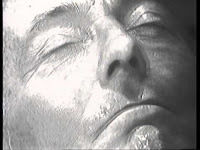 50 years ago today on 29 October 1966, Patrick Troughton made his debut as the Second Dr. Who in the closing moments of The Tenth Planet episode 4. His first full story, The Power of the Daleks, began the following week. It was written by David Whitaker.
50 years ago today on 29 October 1966, Patrick Troughton made his debut as the Second Dr. Who in the closing moments of The Tenth Planet episode 4. His first full story, The Power of the Daleks, began the following week. It was written by David Whitaker.Also on 29 October 1966, David Whitaker was at the annual general meeting of the Writers Guild of Great Britain, where among the topics under discussion were "fair reward[s] for writers of education programmes" and writers being "asked to bear in mind parts for women", plus the election of a new executive council. As the Stage reported on 3 November:
“In the election of officers, David Whitaker was unanimously elected to the chair, with R Vernon Beste re-elected as deputy chairman. Councillors elected were Denis Norden, Wilfred Greatorex, Zita Dundas, Vince Powell, John Lucarotti, Lew Greiffer, John Boland and George Markstein.”Also in November, guild members received Writers News with an introduction from the new chair - an editorial Whitaker wrote each issue for the next 18 months in his role.
The Stage #4464 and Television Today #403, 3 November 1966, p. 9.
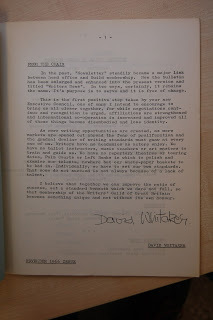
Thanks to Bernie Corbett, Anne Hogben and Emma Reeves at the Writers Guild of Great Britain for permission to dig through the guild archives, and to share what I found. More of this to come...
Published on October 29, 2016 01:21
October 20, 2016
Flower power
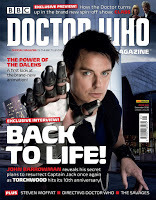 Issue 505 of Doctor Who Magazine is out today, and includes my preview of the forthcoming animation of otherwise-missing 1966 story The Power of the Daleks.
Issue 505 of Doctor Who Magazine is out today, and includes my preview of the forthcoming animation of otherwise-missing 1966 story The Power of the Daleks.I was lucky enough to speak to Anneke Wills, who played Dr. Who's companion Polly in the story, and Charles Norton, who produced and directed the new version. Next issue, there'll be a longer feature talking to more of the team. But the animation is all very exciting, and I can't wait to see the episodes at the BFI event in a couple of weeks.
The new issue of DWM also includes a review of Whographica , my book of Doctor Who inforgraphics, co-written with Steve O'Brien and illustrated by Ben Morris. The three of us will be signing copies at ComicCon in London on Friday 27 October.
And I get a mention in Alan Barnes' typically incisive exploration of the 1966 story The Savages. I found that feature a bit distracting, but can't imagine why.
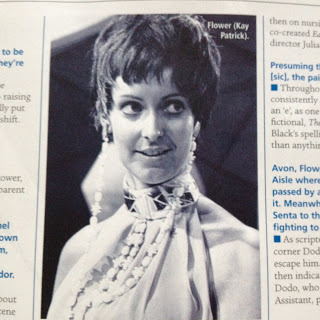 Flower (Kay Patrick)
Flower (Kay Patrick)in 1966 Doctor Who story
The Savages.
Published on October 20, 2016 01:54
October 11, 2016
Ada Lovelace and clock time
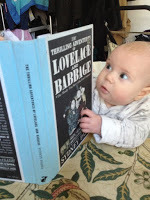 It is Ada Lovelace Day, a day to celebrate women in science and technology. The Guardian has a great piece by Rebekah Higgitt on 19th century astronomer Agnes Mary Clerke (1842-1907). The idea it not just to focus on Ada Lovelace...
It is Ada Lovelace Day, a day to celebrate women in science and technology. The Guardian has a great piece by Rebekah Higgitt on 19th century astronomer Agnes Mary Clerke (1842-1907). The idea it not just to focus on Ada Lovelace...However.
I've been reading up on 19th century science for my forthcoming book on The Evil of the Daleks, and also digging into the life of Ada Lovelace anyway.
Sydney Padua's The Thrilling Adventures of Lovelace and Babbage with Interesting Anecdotes of Celebrated and Distinguished Characters Fully Illustrating a Variety of Instructive and Amusing Scenes; as Performed within and without the remarkable Difference Engine is a gleefully silly and clever book, and the footnotes have endnotes with footnotes. Just look at how lovely it is:
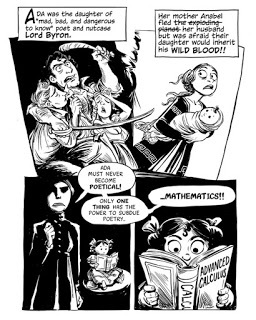 The first page of
The first page of The Thrilling Adventures of
Lovelace and Babbage
by Sydney PaduaBenjamin Woolley's Ada Lovelace - Bride of Science: Romance, Reason and Byron's Daughter (1999) is a lucid biography full of fascinating detail. Particularly brilliant is his explanation on pp. 148-155 of the invention of the metre in revolutionary France, the need to generate logarithmic tables for this new metric system, and Gaspard Riche de Prony's spark of genius, breaking the job down into simple units that could be handled by a production line carried out by three tiers of people: a small number of professional mathematicans, a larger section of "calculators", and some 60 to 80 non-mathematicians,
"the outcasts of the post-Revolutionary era with minimal artithmetical skills and economic power: hairdressers."Woolley then goes on to explain, so simply even I could understand it, how Charles Babbage was inspired by this idea to create his difference engine - effectively, automating the hairdresser part of the process.
Benjamin Woolley, Ada Lovelace - Bride of Science, p. 151.
It was this difference engine that caught the imagination of Ada Lovelace, who collaborated with Babbage on his efforts to building a more complicated machine - a project that Babbage never realised, as both Woolley and Padua explain. But Lovelace, thinking it all through in a footnote about something else, wrote what many regard as the first computer programme, 100 years before the invention of the computer.
Also of great fascination in Woolley's book is Lovelace's relationship with her mentor, Mary Somerville - of whom the word "scientist" was first used. And I also loved this description of the difference between the clocks in churchs - measuring local time - and the new railways clocks based on standardised, Greenwich timekeeping:
"The station clock also came to serve a symbolic purpose. Where the church clock oversaw communal events, a gathering of people who lived with each other and knew each other's affairs, the station clock was the meeting point for strangers, for people trying to escape their localities - for breif encounters of a sort Ada herself would soon experience."Incidentally, I wrote a short story about Ada Lovelace and dinosaurs, "An Experiment in the Formulae of Thought", included in Irregularity (Jurassic London: 2014).
Ibid., p. 275.
Published on October 11, 2016 01:44
October 8, 2016
50 years of the Cybermen
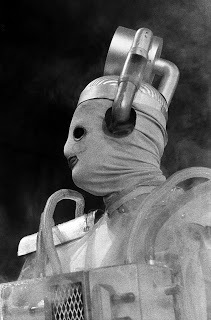 It's 50 years today since the broadcast of The Tenth Planet episode 1, in which a startling new monster was introduced to Doctor Who.
It's 50 years today since the broadcast of The Tenth Planet episode 1, in which a startling new monster was introduced to Doctor Who.I'm not alone in adoring the original versions of the Cybermen, designed by Sandra Reid with skew-whiff cloth faces and still-human hands (painted silver). Clunky and awkward and each one with a name - Krang, Jarl, Gern, Krail, Talon and Shav - they're not simply robots but people who've willingly disfigured themselves to survive in the cold of space.
Researching my book The Scientific Secrets of Doctor Who , I read the "Cyborgs and Space" by Manfred E Clynes and Nathan S Kline, a 1960 article Astronautics that first coined the term cybernetic organism or "cyborg". Although that word wasn't used in Doctor Who until Terror of the Zygons in 1975, there are lots of parallels between the article and the first incarnation of the Cybermen. Here it's suggested that for long-term space exploration to be practical, people will need to be surgically fitted with air conditioning units and then psychologically conditioned not to care...
The cold, stark proposal is utterly terrifying. No wonder the Cybermen struck such a chord.
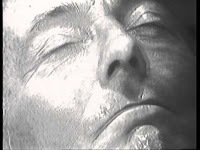 Today is also 50 years since the studio recording of episode 4 of the same story. Between 6.30 and 7 pm, an effects shot was recorded in which a close-up of lead actor William Hartnell morphed into a close-up of Patrick Troughton, the new Doctor...
Today is also 50 years since the studio recording of episode 4 of the same story. Between 6.30 and 7 pm, an effects shot was recorded in which a close-up of lead actor William Hartnell morphed into a close-up of Patrick Troughton, the new Doctor...The episode was broadcast three weeks later, and I shall have more to say about it in three weeks' time.
Published on October 08, 2016 09:56
October 1, 2016
Gaptooth
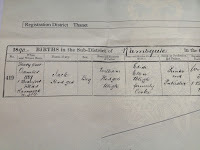 50 years ago today, Jack Bligh appeared as Gaptooth in episode 4 of the Doctor Who story The Smugglers.
50 years ago today, Jack Bligh appeared as Gaptooth in episode 4 of the Doctor Who story The Smugglers. Born on 31 December 1889, Bligh is the earliest born person in Doctor Who. (Some online sources say he was born in 1890, but that's the year his birth was registered; he's listed in the registrations for the Thanet area for the first quarter of 1890.)
Sadly, the four episodes of The Smugglers are among the 97 episodes of Doctor Who missing from the BBC archive. But here are three off-air images ("tele-snaps") showing Gaptooth - from the "photonovel" on the official Doctor Who website:
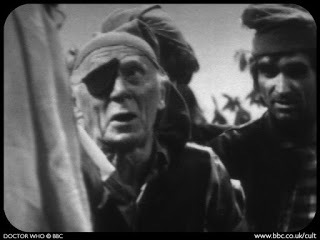
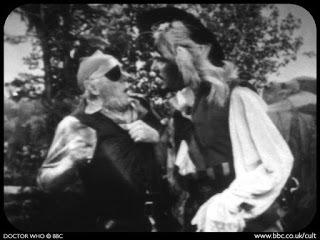
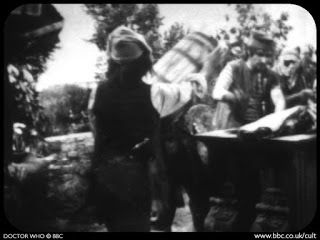
Published on October 01, 2016 00:44
September 29, 2016
On MR James for the Lancet
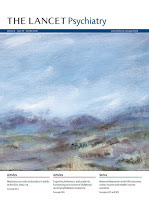 The new issue of the Lancet Psychiatry - vol. 3, no. 10 (October 2016) - is out today, and includes my article on the mind of ghost story writer MR James, who died 80 years ago this year. To read more than the first paragraph you need to pay money.
The new issue of the Lancet Psychiatry - vol. 3, no. 10 (October 2016) - is out today, and includes my article on the mind of ghost story writer MR James, who died 80 years ago this year. To read more than the first paragraph you need to pay money.Also in the issue is Laura Thomas's typically erudite look at Star Trek (2009) and the mindset of leadership.
Here's a helpful link to all my articles for the Lancet.
Published on September 29, 2016 04:28
September 28, 2016
Gravity Fields and the Cosmic Shed
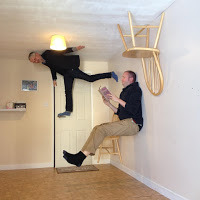 I had an amazing time last week at the Gravity Fields science festival in Grantham and Stamford, where m'colleague Dr Marek Kukula and I were talking about
The Scientific Secrets of Doctor Who
.
I had an amazing time last week at the Gravity Fields science festival in Grantham and Stamford, where m'colleague Dr Marek Kukula and I were talking about
The Scientific Secrets of Doctor Who
. In between our talks, we got to float about in the gravity box, and also took part in a special episode of the Cosmic Shed podcast (our bit starts about eight minutes in). Other guests include Simon Singh, Dallas Campbell, Mara Menzies, Marcus du Sautoy and Tom Adams - it's quite a thrill to be included in such distinguished company. Thanks to Andrew Glester for having us.
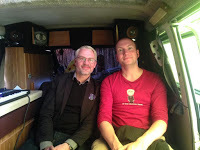 I was also utterly blown away by the exhibition of Kelly Barfoot's amazing solargraphs, and generally by everyone's excitement and enthusiasm. Also, Stamford is very pretty, and it's the first time I've performed in a Georgian ballroom.
I was also utterly blown away by the exhibition of Kelly Barfoot's amazing solargraphs, and generally by everyone's excitement and enthusiasm. Also, Stamford is very pretty, and it's the first time I've performed in a Georgian ballroom.
Published on September 28, 2016 09:27
September 18, 2016
We Are Cult
Exciting new website We Are Cult interiewed me, Steve O'Brien and Ben Morris about our exciting new book of Doctor Who infographics, Whographica.
Whographica is out this week. But I'll be talking about my last book, The Scientific Secrets of Doctor Who, with co-author Marek Kukula at the Gravity Fields festival this Thurday (in Grantham) and Friday (in Stamford).
To promote the festival, I was a guest on the 6 September edition of Chris Berrow's show on BBC Radio Lincolnshire - which you can still listen to on iPlayer for another 18 days. My bit begins at is 02:06:45, just after the 2pm news.
Whographica is out this week. But I'll be talking about my last book, The Scientific Secrets of Doctor Who, with co-author Marek Kukula at the Gravity Fields festival this Thurday (in Grantham) and Friday (in Stamford).
To promote the festival, I was a guest on the 6 September edition of Chris Berrow's show on BBC Radio Lincolnshire - which you can still listen to on iPlayer for another 18 days. My bit begins at is 02:06:45, just after the 2pm news.
Published on September 18, 2016 05:59
September 4, 2016
Front Row on HG Wells
On Monday, I was a guest on Radio 4's Front Row, where learned academic Fern Riddell and I discussed the legacy of HG Wells, who was born 150 years ago on 21 September.
Listen again to Front Row from 29 August 20162015 documentary I produced for Radio 3, HG and the H-Bomb Trailer for 2011 Doctor Who DVD documentary I produced, Alls Wells That Ends Wells
In the studio, we also got to meet Debbie Horsfield, writer and producer of Poldark , which is back on tonight as a special birthday treat for the Dr.
Sorry for the lack of updates. We're just back from a nice family holiday on the Isle of Wight, and I'm about to be lost in a blizzard of deadlines.
Listen again to Front Row from 29 August 20162015 documentary I produced for Radio 3, HG and the H-Bomb Trailer for 2011 Doctor Who DVD documentary I produced, Alls Wells That Ends Wells
In the studio, we also got to meet Debbie Horsfield, writer and producer of Poldark , which is back on tonight as a special birthday treat for the Dr.
Sorry for the lack of updates. We're just back from a nice family holiday on the Isle of Wight, and I'm about to be lost in a blizzard of deadlines.
Published on September 04, 2016 02:37
August 5, 2016
Doctor Who on Location
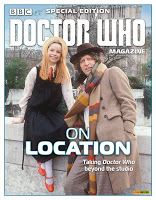 Out now is a new Doctor Who Magazine Special Edition all about the times the TV show has been out on location.
Out now is a new Doctor Who Magazine Special Edition all about the times the TV show has been out on location.Among the many treats, I've spoken to designer Chris Thompson about filming at Grim's Dyke house in Harrow for The Evil of the Daleks (1967); to location managers Nicky James and Iwan Roberts about tracking down all of time and space for the new series - ideally within 45 minutes of Cardiff; and to former producer Marcus Wilson about the influence of The Empire Strikes Back on Asylum of the Daleks (2012).
Thanks to the help of Nick Setchfield at SFX and Kevin Harley from Total Film, I also recall details of our own trip to Doctor Who on location, when we visited freezing cold Neath Abbey on 10 December 2010 to cover the making of The Rebel Flesh.
Published on August 05, 2016 04:13
Simon Guerrier's Blog
- Simon Guerrier's profile
- 60 followers
Simon Guerrier isn't a Goodreads Author
(yet),
but they
do have a blog,
so here are some recent posts imported from
their feed.



